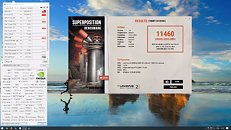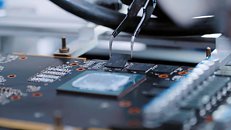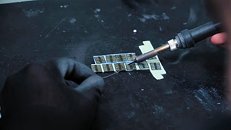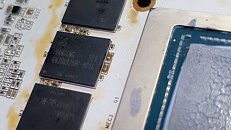Wednesday, November 27th 2019

Memory Chip Swap Mod SUPERcharges an RTX 2080 Ti
Overclocking the memory clock of a GeForce RTX 2080 Ti to 2000 MHz (16 Gbps) isn't difficult, but most custom-design RTX 2080 Ti cards cap out at that, and so the enthusiasts over at TecLab took matters into their own hands by pulling off a daring memory chip replacement mod, by installing 16 Gbps-rated memory chips onto a Galax RTX 2080 Ti HOF graphics card. In a 16-minute video presentation, they detail the process of soldering a component as delicate and sensitive as GDDR6 memory chips, and 45 times over. The team had to sacrifice not one, but two Galax GeForce RTX 2080 Super graphics cards, which feature 16 Gbps-rated memory chips to support the SKU's 15.5 Gbps memory clock. A total of 33 manual solder operations had to be performed (removing the 15 stock chips from the RTX 2080 Ti, removing 11 chips from the two RTX 2080 Super cards, and soldering them onto the RTX 2080 Ti).
The group detailed the process of removing the memory chips under hot air, giving the extracted chips fresh ball-grids, and placing the chips onto the RTX 2080 Ti PCB. No BIOS modding was required, as the RTX 2080 Ti card's video BIOS was able to auto-detect the chips and run them at 14 Gbps. From here on, manual overclocking easily runs the card at 2000 MHz (16 Gbps) memory, with overclocking headroom to spare. The memory clock could now be dialed all the way up to 2150 MHz (17.2 Gbps), something that's close to impossible with 14 Gbps chips. TecLab is calling their creation the world's first RTX 2080 Ti Super, which could very well be true. Last we heard, the RTX 2080 Ti Super could get more CUDA cores, and not just faster memory. Nevertheless, this mod blew our minds, and provides valuable pointers on how to solder dense BGA components without a multi million-dollar placer. We tip our hats to TecLab.Watch the TechLab video presentation here.
Source:
VideoCardz
The group detailed the process of removing the memory chips under hot air, giving the extracted chips fresh ball-grids, and placing the chips onto the RTX 2080 Ti PCB. No BIOS modding was required, as the RTX 2080 Ti card's video BIOS was able to auto-detect the chips and run them at 14 Gbps. From here on, manual overclocking easily runs the card at 2000 MHz (16 Gbps) memory, with overclocking headroom to spare. The memory clock could now be dialed all the way up to 2150 MHz (17.2 Gbps), something that's close to impossible with 14 Gbps chips. TecLab is calling their creation the world's first RTX 2080 Ti Super, which could very well be true. Last we heard, the RTX 2080 Ti Super could get more CUDA cores, and not just faster memory. Nevertheless, this mod blew our minds, and provides valuable pointers on how to solder dense BGA components without a multi million-dollar placer. We tip our hats to TecLab.Watch the TechLab video presentation here.




30 Comments on Memory Chip Swap Mod SUPERcharges an RTX 2080 Ti
Sounds quite cool. I would definitely get behind people doing this at home.
I wonder how well the biggest Turing die will perform if it has fastest 4096bit HBM2 at over 1TB/s bandwidth?
No BIOS modding was required, as the RTX 2080 Ti card's video BIOS was able to auto-detect the chips and run them at 14 Gbps.
looks to me nvidia was holding back perf for dollars when ya think that bios is from aug 2018
I'm wondering how many times they've attempted to take off the stencil before figuring out that you can heat up solder balls beforehand :banghead: :roll:
It is cool to see hardware modders pushing a limit
... I too am interested in seeing the results of a 2060 mod, though!
Some manufacturers wont sell to you unless youre a big company. They arent interested in a small hobbyist who might want a handful of chips to run an experiment - There is nothing in it for them. There wont be any big contracts to sign or any big bucks to be made from that venture.
At the same time there are companies like apple that exist that will pay big money to have manufacturers modify their components in such a way that only they themselves can use it as well as blocking availability to 3rd parties so that repair shops are left buying up faulty doner hardware they can strip down where and when they need to replace parts in a clients faulty device.
If Nvidia thinks they are really onto something groundbreaking. Im sure they would pay manufacturers to prevent sales to AMD and/or making the parts available on the public domain.
infact. some of the small components you can buy from markets in china like memory ICs and capacitors etc etc - a lot of that stuff is stripped off damaged or other hardware so that others can re-use them.
Also, does anyone know if they had added the missing 12th chip to the 2080ti if that would have been detected? Or is that memory channel hard fused off?
I'm assuming it wouldn't be that easy, because surely some OEM would try and ship that as a product much to the ire of nVidia.